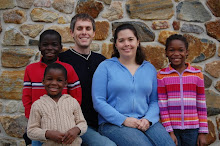For those of you who have wondered what it's like to go from being a couple to a family of 5, here's a reality check from one mommy's perspective. While some things have been easier than anticipated, other things continue to amaze me. Things like how I managed to learn 2 foreign languages but can't remember why I walked into the next room. Or why I can never get anything crossed off my to do list (assuming I remember it long enough to write it down). Or how I can look at our blog and realize that I haven't posted in 11 days even though I'm certain I just did. Or how I can live with guilt every day over thank you notes and birthday cards that haven't been written but still can't motivate my brain to write them in the evening (as if it takes a Ph.D. to write a message). Or how I can repeatedly forget when Peter asks me to post his Ugandan reflections, even though I simply need to proofread and copy them onto our blog. So for those who missed round 1, I am reposting some of Peter's thoughts from his trip to Africa in May. For those who have already read this post, keep watching for parts 2 and 3 over the next few days. I'll definitely have them up before 2008 (as long as someone reminds me several times).
When we started this blog, the intention was to keep our friends and supporters updated on our life, ministry, and prayer needs. Over time, things have shifted to "all kids all the time" because, let's face it, our kids are more interesting than we are. However, in an effort to swing the pendulum back to a more holistic view of life, I (Peter) would like to share a few things that I've been processing over the past few months.
Back in May, I went to
This says nothing about the human element. Colonial rule sapped the limited resources and kept the continent from developing industries to compete in the global market. Government officials take advantage of their positions to help themselves instead of the people. Others wage violent conflict with the established governments because of perceived injustices or simple lust for power. Institutionalized discrimination or persecution as in the
Through it all, children suffer the most, forced to be soldiers or sex slaves, losing parents to violence or disease, dealing with disease themselves, and being denied even a basic education. The average life expectancy in many countries is not even 40 years, and the mass of people who cannot read or write dwarfs those who can.
For the church in
I came away with several personal challenges. I, and many concerned Christians in the
Stay tuned for some stories about some of the people I met and things I experienced in Uganda.





2 comments:
Don't live with the guilt - do what I do - tell people up front you have the most wonderful intentions to send them terrific thank you notes and birthday cards, but that you probably won't get around to it for another 20+ years, so to please forgive you but know that in any spare time you MIGHT ever have you will think of them (unless you opt for taking a hot bath and washing your hair instead - if you remember to buy shampoo and run the bath, that is!). ;P
Peter - I started reading what you just posted yesterday (dec. 3), but felt I needed to go back to refresh my memory. I was struck anew by this paragraph: "For the church in Africa, other questions surface: What does African theology look like? Are they doing theology for themselves or is the West doing it for them? Where do they turn for a contextualized gospel? How much of what they practice is the non-essential trappings of Western Christianity and actually stymies the growth of legitimate expressions of African faith? Who are the role models for church leaders?"
I can honestly say I've never thought about that before. That is a really incredible thought - serious real questions that need real answers from a BIG God. I'm going to read your next post right now.... I'll comment further there.
Post a Comment